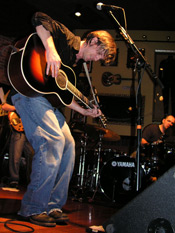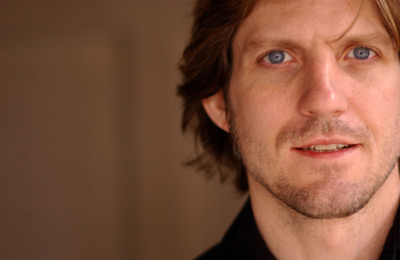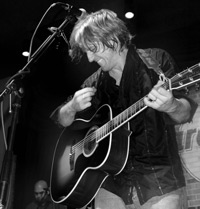
Deasy’s Spark Of Inspiration
Bill Deasy
Andrew Ellis

Just how does an artist better an album widely perceived by fans and critics alike to be his best work? That was the dilemma facing singer-songwriter Bill Deasy when he contemplated making a follow-up to his acclaimed debut solo album, 2003’s Good Day No Rain.
“I loved Good Day No Rain and I was really proud of it,” said Deasy when I recently spoke to him during a brief hiatus from his Pittsburgh base. “The success of that record was more of an inspiration for me rather than a cause for fear, but I wanted to make sure I at least stayed at that level, if not take it up a little bit on this record.”
Ask anybody who has heard the rich tapestry of rootsy melodies and stirring lyrics evident on Deasy’s newest release, Chasing Down A Spark, and they will tell you he has done the latter. But as an independent artist acutely aware of the necessity to build his audience and develop his songwriting, making a carbon copy of Good Day No Rain was never part of Deasy’s strategy.
“Last time out, I consciously steered away from making an electric guitar-driven record,” the Pittsburgh native says. “But I’m over thinking in those terms now, so now I’m happy to reintroduce the electric guitar and feature it more. I wanted this record to be all encompassing in terms of all the different styles of my career. I just wanted to be open to all aspects of my writing.”
The more muscular, guitar-driven sound of Chasing Down A Spark owes a debt of gratitude to the studio expertise of songwriter and producer Kevin Salem and the stellar playing of The Clarks’ guitarist, Rob James, and Deasy admits the process of working with such talent in addition to his studio band was highly satisfying.
“Rob is a real brother of mine, he is such a good friend and he plays with me whenever he can,” Deasy says. “My dream band would include him, but he’ll never leave The Clarks!”
While James is a long-time Deasy ally, a twist of fate helped bring him and Salem together.
“My manager, Holly Greene had a passing acquaintance with Kevin, who had been working more and more as a producer for different artists,” he explains. “She had this feeling that we he would be the right man to produce my record, then she ran into him at a Rachael Yamagata show. So it was a lucky break for me, as he took me in some slightly new directions that helped further the growth of my music.”
Typically brilliant pop-rockers “Until I Get It Right” and “Now That I Know What It Means” pick up where Good Day No Rain left off, but the new directions Deasy refers to are most evident on the rich sonic landscape Salem brought to the fore, with pedal steel, cello, mandolin and accordion all featuring at one time or another, together with the new territory of “Wishing Well”.

Deasy elaborates. “When I first played that to Kevin, he liked the song and the darkness of the lyric, but he thought it was a more interesting song than the way we had been playing it. We had been playing it like a bar band would play it.
He adds: “Kevin is very intuitive as a creator and he flushed out this new concept for it. We didn’t have the idea for the bridge yet, but we knew that would be a departure from the rest of the song. I am thrilled with the way it turned out. It has been controversial for some of my fans that are used to the old way we did the song!”
The scuzzy blues rock of “Wishing Well” may be something of a departure, but the new and the more familiar mingle with ease on Chasing Down A Spark: “Turn Your Light On” has a refreshing, soulful edge, while “Levi” hints at a return to the epic, character-driven songs of Deasy’s former band, The Gathering Field; something he says was not exactly intentional.
“It occurred to me after the fact that “Levi” might, in a way, be a sequel to the song “Lost In America”, because that’s about a drifter who I really wasn’t painting too good a picture of. Maybe that same drifter wound up in NYC and went through this final odyssey that I talk about in “Levi”.”
Fruitful co-writing partnerships with Teitur and Molly Bancroft gave rise to the songs “Pass Me On” and “Until I Get It Right” respectively, and as you would expect of a man who has built a second career writing for the likes of Martina McBride and Kim Richey, the dynamic of writing with other artists is something Deasy thrives upon.
“I first met Teitur in NYC five years ago, when we did some writing,” Deasy reveals. “Then last year, he and I got scheduled at the same club in Pittsburgh on the same night and he opened for me. He stayed at my house and we had a nice conversation about traveling and what it’s like to play for people, the life of a musician, basically. The next morning we got together and wrote “Pass Me On” in an hour. I’d be hard pressed to tell you exactly what it’s about though,” he says with a laugh.
“It is fun to collaborate,” he adds. “I couldn’t have written “Until I Get It Right” like the way it turned out by myself, but that’s the beauty of co-writing. You can express yourself in new ways and I can hear Molly’s contributions in that song. It’s one of my favorites to play live.”

Guests such as vocalists Maia Sharp, Rachael Yamagata and even Donnie Iris added to the overall texture of the album and to Deasy’s enjoyment of the studio sessions.
“The highlights for me are what other people did – Ollie Kraus’ cello parts stunned me as I found them so beautiful,” admits Deasy. “He really gave himself to the process, and all the other guests blew me away too. I’m so used to my own singing and playing, it’s fun to hear other people adding things.”
Even though Chasing Down A Spark is completed and released, it appears the hard work is just beginning for Deasy. In 2004, he released his first DVD, Live At Club Café and he issued the first in a planned series of mainly acoustic “inbetween” songs, Drain Tapes Volume 1, but his focus is firmly on the future. He admits to “writing a ton of songs” which he hopes to pitch to other artists in Nashville soon, but his main priority is Chasing Down A Spark and to build on the profile he gained from Good Day No Rain and the success of “Good Things Are Happening” (the theme song for ABC’s Good Morning America that garnered hom national exposure).
“I feel strongly about this record and I want to get it to as many people as I can,” he says emphatically. “I would welcome a deal, the right kind of a partnership and the help of a little machine. It’s cool to do the grassroots thing, but I could use a shortcut or two right now!”
“I’m still in the process of asserting myself as an artist, but now the bar is a little higher now and I want to find a bigger audience,” he continues. “I imagine there is this audience out there to be had and I need to figure out the best way to get to them.”
But, he adds, with typical modesty, “But I just write songs, and this batch of songs seems to be continuing my growth.”
Bill Deasy: http://www.billdeasy.com ◼












